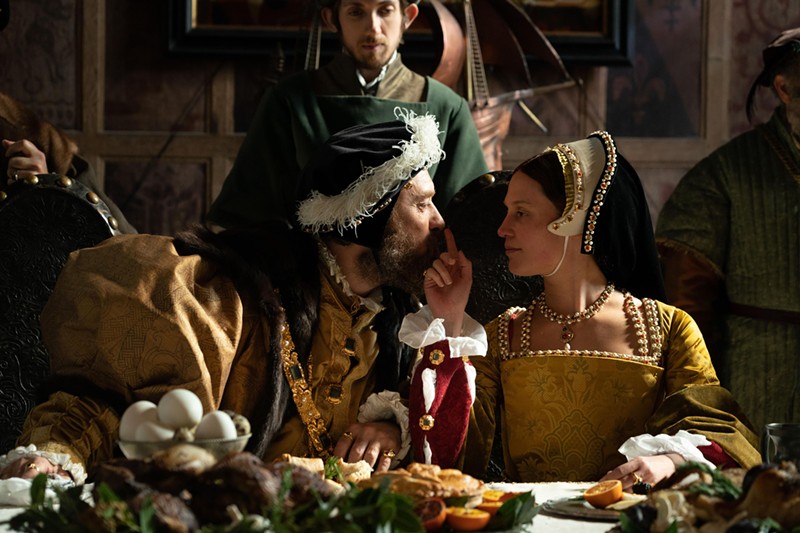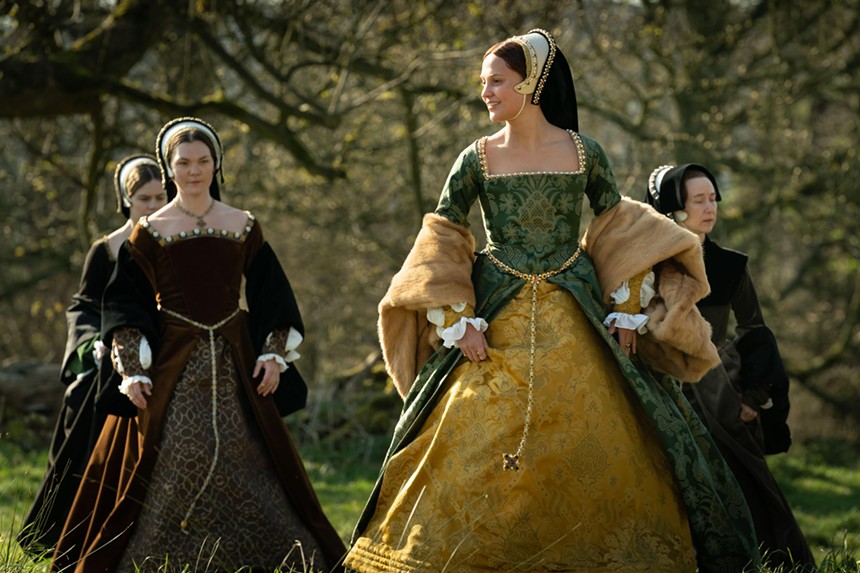It can be hard to look into the past and find any similarities between how people lived then and now. Yet Firebrand, which competed for the Palme d'Or at last year's Cannes Film Festival, manages to do so with a story centered on the life and times of Henry VIII's sixth and final wife. It's 1546, and England is in the midst of a religious upheaval. Thanks to the printing press, people can finally read the bible for themselves, in their own languages, without the need to learn Latin or consult a Catholic priest. Just as the creation of the internet unleashed a wave of access to information and how social media sites like Twitter gave everyone online an equal voice, so did the printing revolution ensure everyone could read the word of God straight from the source. The schism between the Protestants, who want to worship in their own way, and the powers that be, who want everyone to get back into their churches and do what the priests say, forms the backbone of this film.
Catherine Parr, played with quiet intensity by Alicia Vikander, is one of these reformists. She reads the scriptures in English, writes prayer books of her own, and even secretly consults with more radically minded dissidents. Early in the film, she meets with childhood friend Anne Askew (Erin Doherty), now a radical preacher who questions even the king's authority. She ends up a martyr, burned at the stake by Catherine's own husband, the cruel and reactionary Henry VIII, played with grotesque aplomb by Jude Law.
Every high-school history student knows Henry's tale, but for extra measure, it's accounted in voiceover by his daughter, future Queen Elizabeth I (Junia Rees): Desperate to conceive a male heir, Henry cycled through five wives, banishing two, executing two more, and watching the third die after giving birth. He famously broke with the Catholics and established the Church of England in order to divorce his first wife, Catherine of Aragon, legally. However, Henry was not a religious reformer, and the new church was much the same as the old church.
Henry is also dying, slowly and agonizingly, from an ulcerated leg wound that's been left to rot for years — antibiotics were not a thing in Tudor England. Law really puts forth the disgusting essence of the man, a pathetic, squelching mess in his weakest moments and casually tyrannical and vicious at his most lucid. He reminds me a bit of Orson Welles in his older years: once a playboy, now obese, undeservedly haughty, sometimes confused, and frequently tired and disheveled. Welles had none of the king's malevolence, however — he, too, had a few wives but never killed any of them.
None of his unpleasantness is played for laughs, either. Henry is an avatar of toxic masculinity. He and his male retainers belt out horrible songs and mock the women in the court. His anxiety over having only one male heir drives him into fits of jealousy and rage. He torments his wife with power games in court and delights in forcing things into her mouth — his fingers, a necklace that serves as an important plot device — as if to silence her and treat her like a tool. And speaking of tools, his sex scenes with Catherine are deeply, purposefully upsetting — the only nudity we see is the rippling fat of Henry's royal arse as he pumps away at Catherine like a beached whale.
Bodies are key to the power dynamics in Firebrand. The Protestant Reformation marks a historical crossroads between an era of reason and one in which power is determined by marriage and reproduction. Henry does have an heir at this point in time, the future King Edward VII. But everyone seems to know his time is near, subliminally even him, and in a world where anyone can drop dead of plague at a moment's notice, it helps to have some extra potential successors for insurance. Mortality festers in Henry's body just as the potential for life lives in Catherine's, and to save her own skin and any hope of religious reform in England, she has to conceive a child or at least fool everyone into thinking she's pregnant until the king breathes his last. I appreciate how Vikander plays Catherine as a woman under no illusions of her limited societal role, who will do what she can within that role in order to achieve the better world she desires, even marry an absolute monster and have his child.
To that end, the couple also forms the core of the wider political struggle depicted in the film. On one side is Catherine, allied with royal children Elizabeth and Edward, who see her as a surrogate mother, and Edward Seymour (Eddie Marsan), prince Edward's uncle. All have personal reasons for going against the king: His children despise him for doing away with their birth mothers, and it is implied that Seymour and Catherine carry some affection for each other. On the other side are Henry and the Anglicans, Catholics in all but name, personified in conniving Bishop Stephen Gardinier (Simon Russell Beale) and Princess Mary (Patsy Ferran), Henry's daughter with Catherine of Aragon. (In real life, she eventually takes the throne, persecutes the English Protestants, and becomes known as Bloody Mary.)
It can be a bit confusing for those not well-versed in history, and some significant creative liberties are taken when it comes to certain pivotal plot points. I find the inflation of Catherine as a crusader for religious equality to be overblown, and the depiction of Henry's death (spoiler alert: Henry VIII did indeed die in 1547) is completely fabricated for drama in a way that feels excessive. The dialogue also feels unremarkable and a bit too modern at times — we've all read Shakespeare. We all know people sound a bit odd to our ears in this era, and it makes more sense to lean into it than resist. But there's enough to like about the film, especially the visuals. Director Karim Aïnouz and cinematographer Hélène Louvart pack the film full of stunning imagery, from quietly menacing pillow shots of the English countryside just outside the palace walls to painterly compositions of sumptuous period interiors clearly inspired by Vermeer and the other Northern Renaissance masters. The costuming by Michael O'Connor is also outstanding. Ultimately, Firebrand is a competently made period drama with a feminist edge that tackles its source material in a way that feels authentic, even if it's not all there with the facts.
Firebrand. Starring Alicia Vikander and Jude Law. Directed by Karim Aïnouz. Written by Henrietta Ashworth and Jessica Ashworth. 120 mins. Rated R. Check for showtimes at miaminewtimes.com/miami/movietimes.
[
{
"name": "Air - MediumRectangle - Inline Content - Mobile Display Size",
"component": "19274298",
"insertPoint": "2",
"requiredCountToDisplay": "2",
"watchElement": ".fdn-content-body",
"astAdList": [
{
"adType": "rectangle",
"displayTargets": "mobile"
}
]
},{
"name": "Editor Picks",
"component": "17482312",
"insertPoint": "4",
"requiredCountToDisplay": "1",
"watchElement": ".fdn-content-body",
"astAdList": [
{
"adType": "rectangle",
"displayTargets": "desktop|tablet"
},{
"adType": "rectangle",
"displayTargets": "desktop|tablet|mobile"
}
]
},{
"name": "Inline Links",
"component": "18711090",
"insertPoint": "8th",
"startingPoint": 8,
"requiredCountToDisplay": "7",
"maxInsertions": 25
},{
"name": "Air - MediumRectangle - Combo - Inline Content",
"component": "17482310",
"insertPoint": "8th",
"startingPoint": 8,
"requiredCountToDisplay": "7",
"maxInsertions": 25,
"watchElement": ".fdn-content-body",
"astAdList": [
{
"adType": "rectangle",
"displayTargets": "desktop|tablet"
},{
"adType": "rectangle",
"displayTargets": "desktop|tablet|mobile"
}
]
},{
"name": "Inline Links",
"component": "18711090",
"insertPoint": "8th",
"startingPoint": 12,
"requiredCountToDisplay": "11",
"maxInsertions": 25
},{
"name": "Air - Leaderboard Tower - Combo - Inline Content",
"component": "17482313",
"insertPoint": "8th",
"startingPoint": 12,
"requiredCountToDisplay": "12",
"maxInsertions": 25,
"watchElement": ".fdn-content-body",
"astAdList": [
{
"adType": "leaderboardInlineContent",
"displayTargets": "desktop|tablet"
},{
"adType": "tower",
"displayTargets": "mobile"
}
]
}
]













